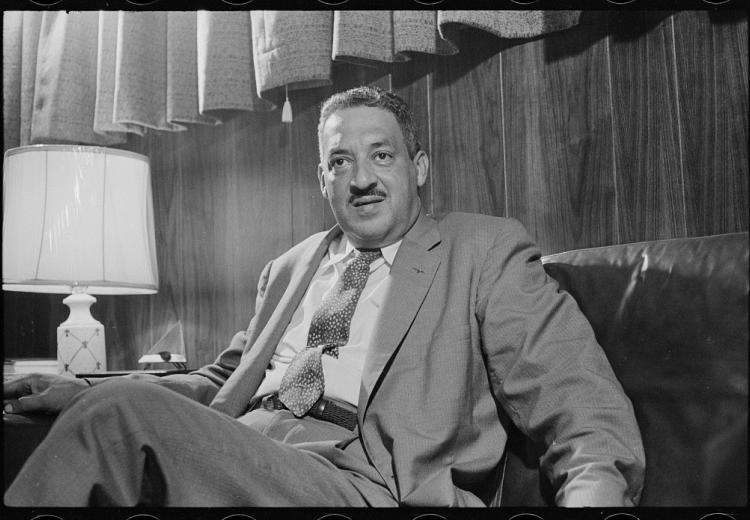Thurgood Marshall Before the Court

Thurgood Marshall, photographed by Thomas J. O'Halloran, 1957.
In this American Radio Works podcast and website, partially funded by NEH, Stephen Smith presents the story of Thurgood Marshall's remarkable career. In 1967, Marshall became the first African American named to the United States Supreme Court, but his most significant legal victory came when Marshall was on the other side of the bench, arguing the landmark Brown v. Board of Education case. Before he joined the Supreme Court, he was the nation's leading civil rights lawyer.
Note: This podcast contains racial slurs.
Classroom Connections
The following questions can focus student's listening or reading of the podcast transcript. Please note that the podcast and transcript contain racial slurs.
Comprehension Questions:
- What evidence did Marshall use to fight segregation?
- What does this podcast illustrate about the limits of law and the Constitution in securing equal rights and freedom for discrimination?
- How did law function as both an instrument of violence and racism, and protection and equality? Provide concrete examples from the podcast.
- According to the podcast, why was desegregation of public schools such a controversial and inflammatory issue?
- Why did the Supreme Court ultimately decide that segregated education was "inherently unequal"?
- How did Marshall's strategy compare to that of other major civil rights figures?
The Miseducation database, created by ProPublica, documents persistent racial inequality in public schools across the United States. The data are from 2015-2016. Students can review data on local schools and get a sense for the ways segregation and unequal treatment of Black, Hispanic, and White students have endured long after "separate but equal" was found unconstitutional?
Questions for reflection and further research:
- Even if a school is integrated, it may be unequal. What are some forms of racial inequality that can exist within a single school?
- More than 50 years after Marshall helped win Brown v. Board and make the segregation of public schools illegal, racial inequalities between and within schools persist. Why is this the case? What forces and factors contribute to the perpetuation of these inequalities?
- How have people fought to end de facto school segregation—that is, not just the laws allowing segregation, but the practice itself?
